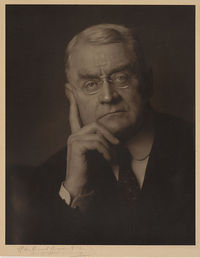
Summary
John Andrew Hamilton, 1st Viscount Sumner, GCB, PC (3 February 1859 – 24 May 1934) was a British lawyer and judge. He was appointed a judge of the High Court of Justice (King's Bench Division) in 1909, a Lord Justice of Appeal in 1912 and a Lord of Appeal in Ordinary (Law Lord) in 1913. Created a life peer as Baron Sumner in 1913, he was further honoured when he was granted a hereditary peerage as Viscount Sumner in 1927.
The Viscount Sumner | |
|---|---|
 Contemporary photograph of Lord Sumner by Walter Thomas | |
| Personal details | |
| Born | 3 February 1859 Chorlton-upon-Medlock, Lancashire |
| Died | 24 May 1934 (aged 75) |
| Nationality | British |
| Spouse |
Maude Margaret Todd (m. 1892) |
| Alma mater | Balliol College, Oxford |
Background and education edit
Hamilton was born in Chorlton-upon-Medlock, Lancashire,[1] the second son of Andrew Hamilton, an iron merchant of Manchester,[2] and his wife, Frances, daughter of Joseph Sumner.[3] He was baptised at the Church of St Wilfrid, Northenden.[4]
Hamilton was educated at Manchester Grammar School and Balliol College, Oxford.[1] In 1883, he was called to the bar, Inner Temple.[2] Hamilton was a Fellow of Magdalen College, Oxford, for seven years from 1892 and was nominated an honorary fellow in 1909.[3] He received an Honorary Doctorate of Laws by the University of Edinburgh in 1913 and by the University of Manchester in 1919.[5] One year later, Hamilton obtained also an Honorary Doctorate of Civil Law by the University of Oxford.[5]
Judicial career edit
Hamilton joined in the Northern Circuit and became a King's Counsel in 1901.[2] He was elected a standing counsel to the Oxford University in 1906, a post he held for the next three years.[5] On his appointment as Judge of the High Court of Justice (King's Bench Division) in 1909, he was knighted and invested a bencher.[2] In 1912 he became a Lord Justice of Appeal and sworn of the Privy Council.[2] Already in the following year, Hamilton became a Lord of Appeal in Ordinary and created a life peer as Baron Sumner, of Ibstone, in the County of Buckingham.[6] He was further honoured, when on 31 January 1927, he created a hereditary peerage as Viscount Sumner, of Ibstone, in the County of Buckingham.[7] Hamilton retired as judge in 1930.[1]
Further career edit
In 1908, Hamilton was Inspector in the Swansea Education Dispute.[2] In the House of Lords, he was chairman of the Working Classes Cost of Living, the British Cellulose Enquiry and the British and Foreign Legal Procedure committees.[2] Hamilton took part at the Treaty of Versailles in 1919 as delegate of the reparations commission, for which he was appointed a Knight Grand Cross of the Order of the Bath (GCB) in the 1920 Birthday Honours.[2] In the next year, he chaired the Royal Commission on Compensation for Suffering and Damage by Enemy Action.[5]
Family and legacy edit
In 1892, he married Maude Margaret Todd, the second daughter of Reverend John Wood Todd,[3] a Baptist minister who with his wife founded what became Tudor Hall School. Hamilton's marriage was childless, and with Hamilton's death, the viscountcy became extinct.[3]
In 2009, a biography of Lord Sumner was published by Anthony Lentin.[8]
Arms edit
|
Famous judgements edit
- Bowman v The Secular Society (1917)
- Elder Dempster & Co v Paterson Zochonis & Co (1924)
References edit
- ^ a b c "The Open University - Lord Sumner: a 'vice-like grip of legal principles'". Retrieved 8 July 2009.
- ^ a b c d e f g h Debrett, John (1922). Arthur G. M. Hesilrige (ed.). Debrett's House of Commons and Judicial Bench. London: Dean & Son, Ltd. p. 346.
- ^ a b c d Whitaker's Peerage, Baronetage, Knightage, and Companionage. London: Whitaker & Sons. 1921. p. 535.
- ^ Lentin, Antony (14 January 2009). The Last Political Law Lord: Lord Sumner (1859-1934). Cambridge Scholars Publishing. p. 15. ISBN 978-1-4438-0381-6. Retrieved 14 March 2022.
- ^ a b c d Who is Who 1926. London: Adam & Charles Black Ltd. 1926. p. 2816.
- ^ "No. 28766". The London Gazette. 21 October 1913. p. 7335.
- ^ "No. 33245". The London Gazette. 4 February 1927. p. 722.
- ^ "Spectator Book Club - Review of "The Last Political Law Lord: Lord Sumner, 1859-1934"". Archived from the original on 15 March 2009. Retrieved 8 July 2009.
- ^ Debrett's Peerage. 1921.
External links edit
- Hansard 1803–2005: contributions in Parliament by John Hamilton, 1st Viscount Sumner
- Portraits of John Hamilton, 1st Viscount Sumner at the National Portrait Gallery, London


